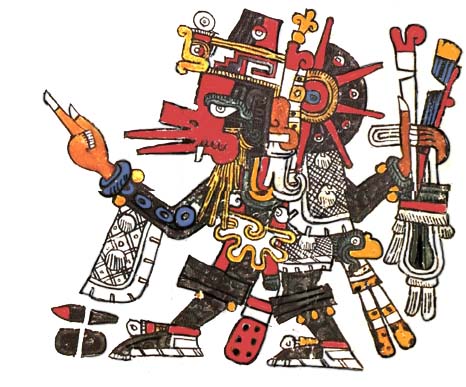 |
| Wind God (Tokyo National Museum) |
Number one. I rearranged everything relative to all the mainstream textbooks. That includes teaching evolution (common ancestry, deep time), then inheritance, variation, and mutation, then genetic drift and gene flow and THEN natural selection.
Number two. I actively teach creation alongside evolution and am ashamed that it took me this long to do it (but won't beat myself up too much about it considering all the political pressure to keep it out of science classes, which I'm sympathetic to but no longer agree with entirely. For more read here.)
Number three. Students voluntarily spat for 23andMe and were able to see thousands of their SNPs that were genotyped for free and also heard excellent guest speakers on genetics and genetic testing. (All thanks to a teaching grant I received from my university.)
Students who take this course are mostly freshmen and sophomores (18-20 years old) who are undecided majors or non-majors. It serves as a "general education" credit in the natural sciences that fulfills graduation requirements for nearly all majors on campus. The course is required for any anthropology majors and minors in the class, and future ones.
I pre- and post-tested them on science and evolution issues--using the same questions* I asked of students in the Fall 2011 course where I did not implement this curriculum. I also surveyed the students at the end of the semester about the 23andMe experience (and I may report the results of that survey in a later post).
Based on those pre- (n = 82) and post- (n = 85) tests, here's a bit of what I learned about what they learned during Spring 2012, either inside or alongside my course, during those three or so months of their lives. Percentages are presented as pre...post %.**
 |
| Wind God, Ehecatl, an avatar of Quetzalcoatl (en.wikipedia.org) |
Result #1: Greater understanding of, and confidence about, evolution and science
Showed improvement.
From already correct majority to even larger correct majority. Listed from least to most improvement.
- There is lots of evidence against evolution. 78...81% disagree
- If two light-skinned people moved to Hawaii and got very tan their children would be born more tan than they (the parents) were originally. 85...88% disagree
- Humans and chimpanzees evolved separately from an ape-like ancestor. 70...73% agree
- Dinosaurs and humans lived at the same time in the past. 83...87% disagree
- A species evolves because individuals want to. 83...88% disagree
- Variation among individuals within a species is important for evolution. 84...92% agree
- You cannot prove evolution happened. 70...79% disagree
- A scientific theory is a set of hypotheses that have been tested repeatedly and have not been rejected. 78...88% agree
- The theory of evolution correctly explains the development of life. 77...88% agree
- Evolution is always an improvement. 54...72% disagree
- Evolution cannot work because one mutation cannot cause a complex structure (e.g., the eye). 62...88% disagree
From incorrect majority to correct majority.
- New traits within a population appear at random. 59% disagree...55% agree
- A species evolves because individuals need to. 73% agree... 49% disagree
- “Survival of the fittest” means basically that “only the strong survive.” 65% agree...72% disagree
For comparison...Fall 2011 students (remember, they did not have the three curricular changes; n= 70) improved on only 10 of the 14 questions above. Here are the four exceptions where they did not improve (and instead got worse!):
- Dinosaurs and humans lived at the same time in the past.
- If two light-skinned people moved to Hawaii and got very tan their children would be born more tan than they (the parents) were originally.
- A species evolves because individuals need to.
- “Survival of the fittest” means basically that “only the strong survive”.
Showed improvement, but still WRONG.
Fewer students chose the wrong answer and by extension more students chose the correct answer. None of these questions showed improvement by Fall 2011 students.
- The environment determines which new traits will appear in a population. 80...76% agree (should disagree)
- All individuals in a population of ducks living on a pond have webbed feet. The pond completely dries up. Over time, the descendants of the ducks will evolve so that they do not have webbed feet. 69...59% agree (should disagree)
- If webbed feet are being selected for, all individuals in the next generation will have more webbing on their feet than individuals in their parents’ generation. 59...51% agree (should disagree)
Fewer chose the correct answer. All of these also got worse for 2011 students.
- Small population size has little or no effect on the evolution of a species. 79...78% disagree
- If two distinct populations within the same species begin to breed together this will influence the evolution of that species. 88...83% agree
- A scientific theory that explains a natural phenomenon can be defined as a “best guess.” 45% disagree...53% agree
Huh?
88% agree with: A scientific theory is a set of hypotheses that have been tested repeatedly and have not been rejected.
Okay, great, but 53% also agree with: A scientific theory that explains a natural phenomenon can be defined as a “best guess.”
Stayed the same. Also stayed the same in 2011.
Two of the most important factors that determine the direction of evolution are survival and reproduction. 94...94% agree
On confidence...
I have a clear understanding of the meaning of scientific study. 76...89% agree
I have a clear understanding of the term “fitness” when it is used in a biological sense. 58...88% agree
Stayed the same. Also stayed the same in 2011.
Two of the most important factors that determine the direction of evolution are survival and reproduction. 94...94% agree
I have a clear understanding of the meaning of scientific study. 76...89% agree
I have a clear understanding of the term “fitness” when it is used in a biological sense. 58...88% agree
Comments
In terms of some fundamentals, undergrads seem to have a decent handle on things coming into my class but there's still a lot of room for improvement. It's frustrating how some of these that show improvement only to 73% (like question 8). I mean, roughly 95% get question 8 right on the exam but with different wording. To get to the bottom of it, I think I'll talk through #8 explicitly with students. I do think that in many instances semantics are muddying the results. Unfortunately I can't change the wording if I want to keep comparing results to prior semesters (and to the results published in the source article*).
Nevertheless, it's clear that 2012's students outperformed 2011's by improving on more questions (both the ones the majority already knew and the ones that the majority still does not know but is getting there!). Next time I'm going to need to better cover "theory," population size effects, gene flow effects, and general population variation over the generations. Or I can continue, like I do, to go further in depth with population genetics in the upper level courses, since I can't expect students to learn everything in one semester. I didn't after all. Still haven't!
 |
| Wind God, Vayu (en.wikipedia.org) |
Result #2: No need of that hypothesis
Let's compare the responses between 2011 (remember, no rearranged presentation, no teaching creation, and no 23andMe) and 2012 with their pre...post %.
Fall 2011
Agree: 26...25%
Disagree: 57...58%
No opinion/undecided: 17...17%
Spring 2012
Disagree: 57...72%
No opinion/undecided: 17...13%
Comments
That's an increase of 15% of students in my course who disagree, which is to report that they have no need of the god hypothesis for human evolution and no need for human exceptionalism.***
That degree of change is roughly on par with the improvement seen here (from above):
- The theory of evolution correctly explains the development of life. 77...88% agree
- Evolution is always an improvement. 54...72% disagree
- Evolution cannot work because one mutation cannot cause a complex structure (e.g., the eye). 62...88% disagree
- A species evolves because individuals need to. 73% agree... 49% disagree
- “Survival of the fittest” means basically that “only the strong survive.” 65% agree...72% disagree
- I have a clear understanding of the meaning of scientific study. 76...89% agree
- I have a clear understanding of the term “fitness” when it is used in a biological sense. 58...88% agree
Even if stats enable me to predict improvements with letting go of supernature, I'm not so sure that it will be clear that this change was caused by my course and new curriculum. For me, my loss of the supernatural was so gradual that I can't credit one course! I just kind of sloughed off the supernatural over time. So it's quite possible that these results don't reflect a change in many of those students, as much as their new found willingness to admit that a change is occurring or has occurred. Still, that I tried out this new curriculum... it's hard not to assume causation from correlation. (But like I said, I have to do the stats if I'm to see about that.)
I'm not going to lie... I'm so proud of my students for how they answered this one question. And I'm not going to pretend this isn't dangerous information that our friends and heroes who battle creationist politicians might not like to share with those creationist politicians!
The fear of losing the god hypothesis is a major reason why creationists don't want evolution to be the only explanation taught in K-12 biology classrooms (or don't want it taught at all). And it's also why the human animal is so often left out of K-12 biology curriculum. And my experience, here, suggests that that fear is justified! But what's ironic about the creationist plea for getting creation into science classes to better "teach the controversy" and to cover "competing theories" (the only two being creation and evolution) is how my experience suggests that teaching creation alongside evolution is a recipe for losing supporters of the supernatural. (see here)
It's important to notice that the question I ask students is not about whether they believe in God, or are religious or spiritual, or pray or meditate, or whether they believe in a higher power or a greater force or anything like that! It's just asking whether human nature requires supernature. And they're saying no.
Why does that matter? Why am I so proud of them? Here's just one reason: Because if you accept nature, then you somehow understand the delicate role of each species, including humankind, in the ecosystem. And maybe humans who see this more clearly will take more compassionate, human-friendly, and Earth-friendly actions at the market, in the voting booth, and in their communities.
 |
| Juno Asking Aeolus to Release the Winds, F. Boucher, Paris, 1769 (Uppity note: The original title was Pull My Finger and Boucher's later variations on this theme incorporated Prometheus.) |
Notes
* Assessment pre- and post-test questions are taken from this article: Cunningham DL, Wescott DJ. Still more "fancy" and "myth" than "fact" in students' conception of evolution. Evolution: Education and Outreach 2009;2:505-517.
**Students are asked to report whether they "strongly agree," "somewhat agree," "somewhat disagree," "strongly disagree," or "no opinion/undecided/never heard of it." I don't report everything here. And I'm lumping "strongly" and "somewhat" categories into just plain "agree" or "disagree."
***Unfortunately another way to read this statement and yet still disagree with it is from the hard core creation perspective: No evolution at all! However, I have few of those students in my course and expect to have fewer of them, not more of them, by the end of the course. That's not because they change their minds about hardcore creation, necessarily, but because the few who'd take my course in the first place would probably drop it before it's over. I will add a question that is better worded to the next round of tests in the Fall semester and I'll keep this one as reference. Something like "Evolution does not explain human existence" would help me gauge how many might disagree with the above question from the minority (no evolution at all) perspective.

7 comments:
What an interesting teaching strategy. Looks like you had quite an impact on those students.
Kudos to you for putting so much time and effort into analyzing your teaching of evolution! Even though it could be argued that you are comparing different groups of students in comparing across semesters, the way you think through how to effectively communicate, test, and then think about it again is a valid approach to improvement in my opinion.
thanks Hollis! I agree about the sampling issue comparing between semesters (and I'm a different prof each time I teach too!) However, the pre and post % are within a semester... so tracking improvement within one semester is avoiding that sampling issue. To see more improvement in one group compared to the other is, to me, indicative that the changes are working!
Holly, it looks like you didn't have many students drop out of the course, but I have wondered for a while if some proportion of the change in the questions related to the supernatural is due to students with strong religious faith disproportionately dropping the course between the pre- and post-test. Any thoughts?
Yep. I agree that probably factors in.
This is a fabulous post--thank you for documenting all this, and it should be a model for biology and anthropology courses. I've recently had to think about anthropology and student learning outcomes assessment. This provides a great resource, and I've linked to it in my post.
Thanks Jason for the link and for writing your post too!
Post a Comment